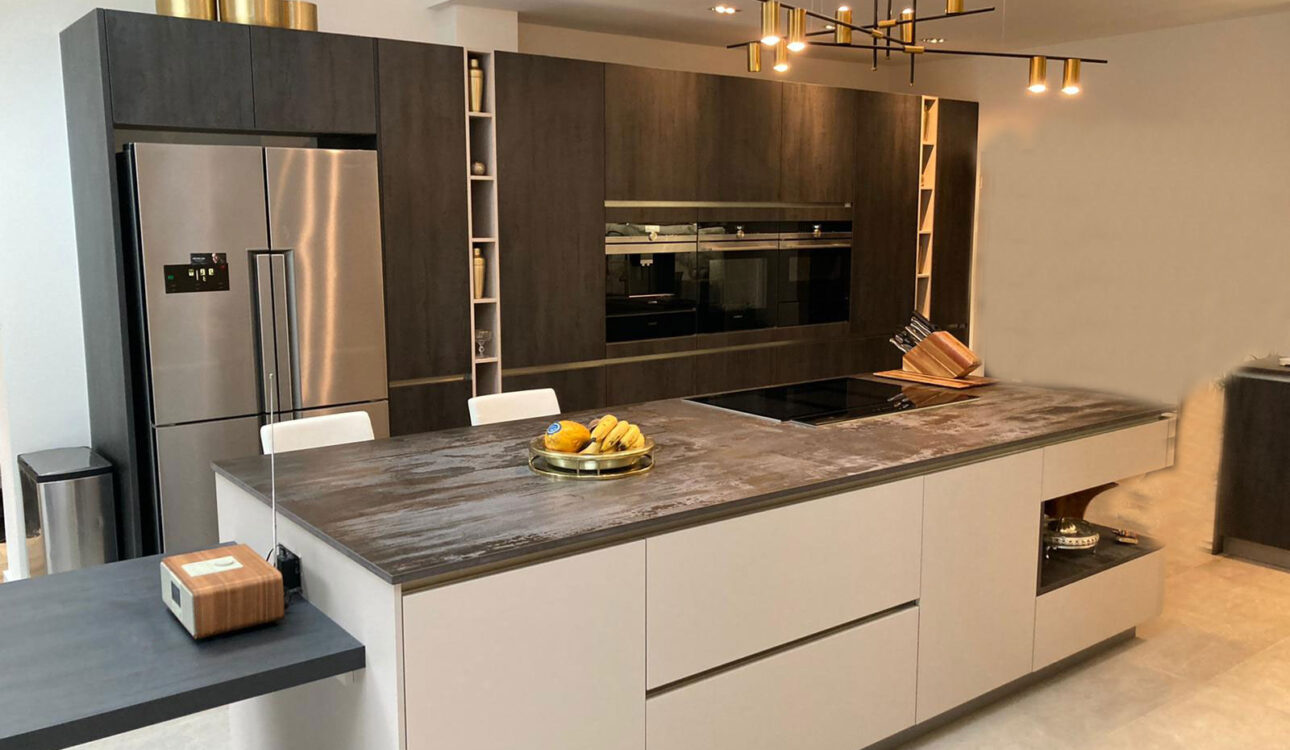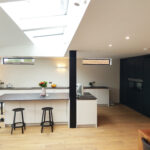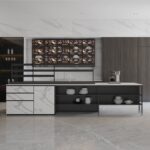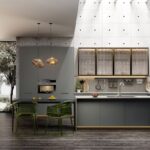When it comes to choosing the heart of your home – the kitchen – quality, durability, and peace of mind are paramount. In the realm of kitchen design, the debate over backboard thickness has long been a topic of discussion. While bespoke kitchen manufacturers tout their solid 18mm backboards as a hallmark of quality, German kitchens take a different approach, favoring slim backboards for reasons that speak volumes about craftsmanship and practicality.
The USP of Bespoke Kitchen Manufacturers: The 18mm Backboard Myth
Bespoke kitchen manufacturers often pride themselves on their kitchens’ solid 18mm backboards. They argue that these thick backboards provide strength and stability to the kitchen carcasses, ensuring longevity and durability. However, the reality behind this claim reveals a different story.
Local manufacturers typically utilize MFC (Melamine Faced Chipboard) sheets, which cost between £30 to £60, to construct their kitchen carcasses. To optimize cost-efficiency, these manufacturers cut the sheets to the required sizes, using the same material for both the back and sides of the cabinets. This practice, while seemingly economical, sacrifices true quality and strength.
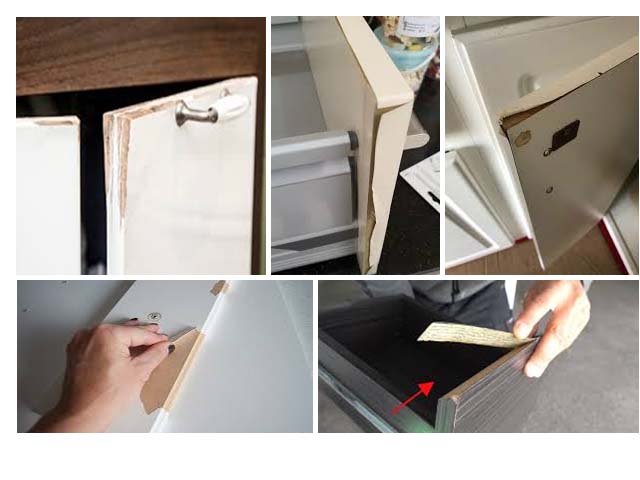
In addition to selecting the right kitchen manufacturer, it’s crucial to ask the right questions to ensure that your investment aligns with your expectations for quality, durability, and longevity. When engaging with bespoke kitchen manufacturers, consider probing deeper into the following key areas:
Kitchen Legs: Inquire about the type and quality of kitchen legs being used. Since they bear the weight of the kitchen and worktop, sturdy and reliable legs are essential for long-term stability.
Drawer Runners: Ask about the quality and durability of the drawer runners being installed. A, B, or C quality runners can significantly impact the functionality and longevity of your kitchen drawers.
Hinges Quality: Inquire about the hinges being used in your kitchen cabinets. Lower-quality hinges may compromise the integrity of the cabinets over time, leading to issues such as sagging doors or loose hinges.
MFC Sheets: Seek clarification on the density and durability of the MFC sheets being utilized. Ensure that they are robust enough to withstand daily use and potential wear and tear for at least two decades.
MFC Sheets Pricing: Verify the source and pricing of the MFC sheets being used. It’s essential to confirm whether they are sourced from reputable suppliers and whether they fall within the £30-£50 price range.
Edging Technique: Determine whether the cabinet edging is glued or laser-edged. Laser-edged edging typically offers superior durability and a seamless finish compared to traditional glued edging.
Cabinet Edging Guarantee: Inquire about the manufacturer’s guarantee for cabinet edging. A reliable manufacturer should stand behind the quality of their products and offer assurances regarding the longevity of the cabinet edging.
Moisture Resistance: Ask whether the cabinets are suitable for use in moist environments such as bathrooms. Ensuring moisture resistance is essential for maintaining the integrity and appearance of your kitchen cabinets in humid conditions.
Redrilling Capability: Clarify whether the MFC material allows for redrilling of screws in case of installation errors or adjustments. Flexibility in this aspect can prevent costly mistakes during installation.
Guarantee Policy: Discuss the manufacturer’s guarantee policy and inquire about the procedures in case of discontinued door designs.
By asking these critical questions, you can make informed decisions and select a bespoke kitchen manufacturer that prioritizes quality, durability, and customer satisfaction. Don’t hesitate to delve into these details to ensure that your kitchen investment stands the test of time and exceeds your expectations for years to come.
German Kitchens: A Legacy of Craftsmanship and Innovation
In stark contrast, German kitchen manufacturers have honed their craft over centuries, prioritizing innovation and quality in every aspect of their designs. Rather than adhering to the thick 18mm backboard trend, German kitchens typically feature slim 6-12mm back panels crafted from highly dense Bioboards.
Despite their slender profile, German kitchen backboards boast exceptional durability and strength, owing to the superior quality of materials and meticulous engineering processes employed by German manufacturers. These kitchens have been transported worldwide and fitted seamlessly, showcasing the reliability and resilience of German kitchen design.
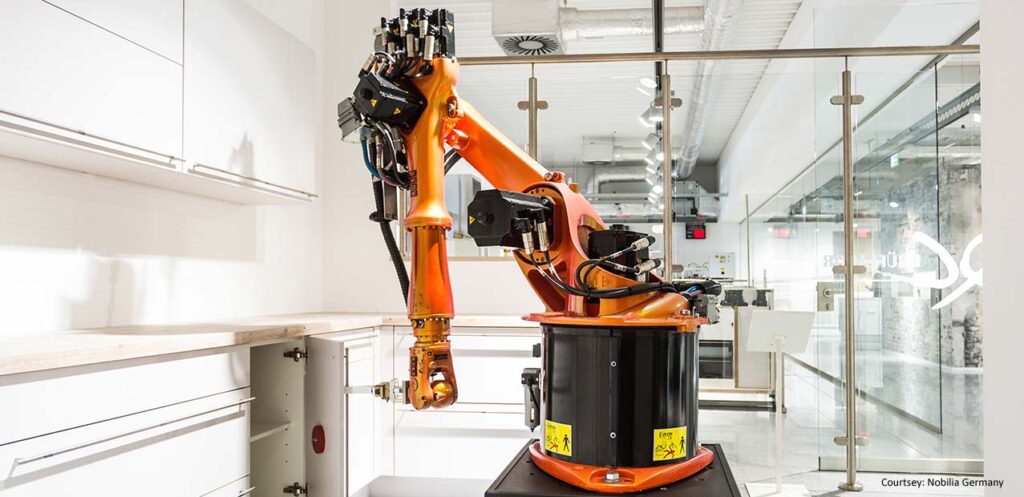
The Case for German Kitchens from Kudos Interior Designs
For discerning homeowners seeking the pinnacle of kitchen excellence, German kitchens from Kudos Interior Designs offer an unrivaled combination of quality, durability, and peace of mind. By choosing German craftsmanship, customers can expect:
-
Quality Materials: German kitchens utilize highly dense Bioboards, renowned for their superior strength and durability compared to traditional MFC sheets used by bespoke manufacturers.
-
Innovative Design: German kitchen manufacturers integrate cutting-edge design principles to create sleek and functional spaces that elevate the kitchen experience.
-
Global Reputation: With over 200 years of expertise, German kitchen manufacturers have earned a global reputation for excellence, trusted by homeowners and designers alike.
In conclusion, the debate over backboard thickness underscores the fundamental differences between bespoke and German kitchen manufacturers. While bespoke kitchens may tout their solid 18mm backboards, German kitchens’ slim backboards offer a superior blend of craftsmanship, innovation, and durability. For those prioritizing quality and longevity in their kitchen investment, German kitchens from Kudos Interior Designs stand as the undisputed choice, relegating bespoke kitchens to the shadows of antiquated design practices.

